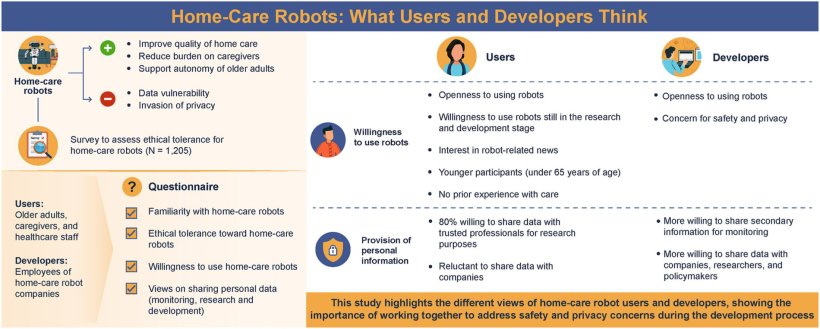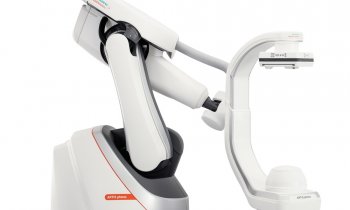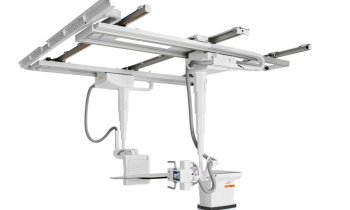News • Study explores openness for home-care use
Are we ready for robot caregivers? – “Yes, if…”
Are we ready to live with caregiving robots? With Japan facing a projected shortage of 570,000 care workers by 2040, researchers at Chiba University surveyed older adults, families, caregivers, and developers about their acceptance of home-care robots.

© M.Dörr & M.Frommherz – stock.adobe.com
They found that openness to using robots influenced willingness among both users and developers, while other factors differed between the groups—revealing distinct perspectives and highlighting the need for collaboration and ethical awareness in developing home-care robots.
Robots have never felt as close to becoming a part of everyday life as they do today. Their widespread use now seems likely in the near future. But as technology advances, important social questions remain. Are we ready to live and work alongside robots? Many people worry about safety, the loss of human contact, high costs, and the potential for robots to take over human jobs. These concerns are especially important when it comes to caregiving robots that assist older adults.
A new study by researchers at Chiba University in Japan reveals a general openness to using home-care robots, as long as people view them as beneficial to society. The findings highlight the delicate balance developers must strike between innovation and maintaining users’ trust.
The study, published in the journal Computers in Human Behavior, was led by Professor Sayuri Suwa from the Graduate School of Nursing at Chiba University, Japan. The research team also included Dr. Yumi Akuta from Tokyo Healthcare University, Japan; Dr. Naonori Kodate from University College Dublin, Ireland; Dr. Wenwei Yu from Chiba University; and Dr. Mayuko Tsujimura from Shiga University of Medical Science, Japan.
Our results conclude that a collaborative ecosystem involving all stakeholders, aligned with ethical principles and shared interests, is essential for the successful development and implementation of home-care robots
Sayuri Suwa
“Crucially, the results indicate that greater collaboration between users and developers, together with careful attention to ethical considerations, is essential for accelerating the adoption and societal implementation of home-care robots,” says Prof. Suwa.
Caregiving robots are expected to play an important role in Japan, which has the world’s fastest-aging population and a shortage of care workers. By 2040, the country may lack around 570,000 care workers. To understand how people feel about home-care robots, the researchers conducted a large survey with 4,890 participants, including older adults, their families, caregiving staff, and robot developers.
Participants were asked about their willingness to use home-care robots and whether they would share personal data with them. Questions included, ‘Would you like to use a home-care robot when receiving care yourself?’ and ‘Would you like to use one when caring for a family member?’ They were also asked what types of personal information, such as vital signs, voice recordings, and location data, they would be comfortable sharing with robots.
Out of the responses from 1,122 potential users and 83 developers, the results showed that willingness to use home-care robots varied by age and familiarity. People under 65 years of age were the most open to using robots, both for themselves and their families. Women were slightly more positive than men. Participants who followed robot-related news or were interested in testing new robots were also more willing to use them. Developers, on the other hand, were mainly concerned about safety and privacy. Both users and developers who supported robot use said that protecting privacy was important. They also expressed a desire to participate in developing and improving home-care robots.

Image source: Akuta Y, Suwa S, Kamimoto T et al., Computers in Human Behavior 2026 (CC BY 4.0)
When it came to sharing personal data, about 80% of users said they were willing to share information such as vital signs and voice data with healthcare professionals for research. But only 40–50% were comfortable sharing that data with robotics companies. This shows that trust and transparency are key factors in how people view robots.
“Our results conclude that a collaborative ecosystem involving all stakeholders, aligned with ethical principles and shared interests, is essential for the successful development and implementation of home-care robots. Through such collaboration, these robots can support older adults in living independently within their homes and communities, while also easing the burden on family and professional caregivers,” emphasizes Prof. Suwa.
As Japan’s aging population continues to grow, using robots and other innovative technologies in home care will become an important part of addressing social and healthcare challenges. With careful planning and attention to ethics, home-care robots could help create a society where people and technology work together to support well-being, independence, and dignity in old age.
Source: Chiba University
07.11.2025








